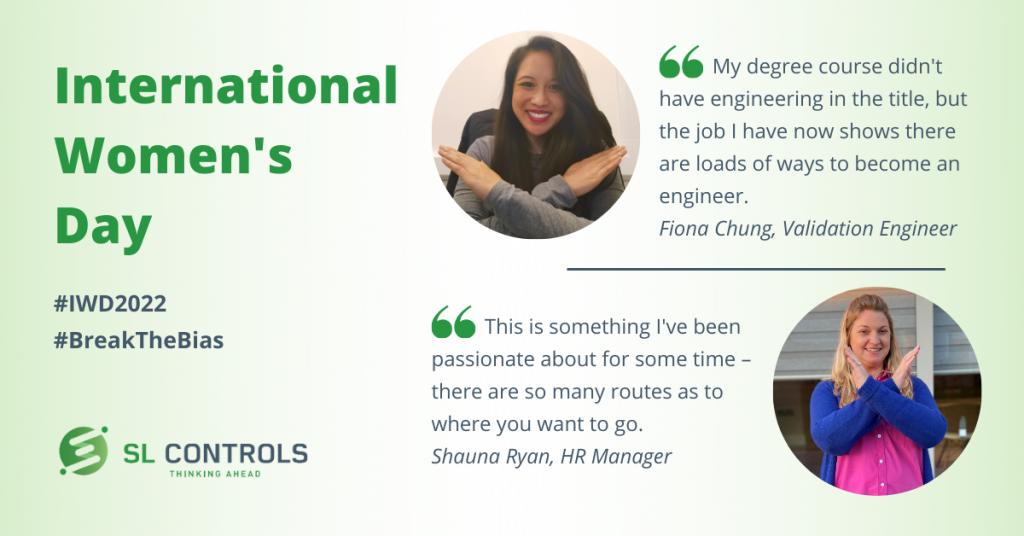There are lots of different paths you can take to become an engineer, so don’t just follow the traditional route of going to college to get an engineering degree.
That’s the message from Fiona Chung on International Women’s Day. Fiona is a Validation Engineer at SL Controls.
This year’s theme for International Women’s Day is Break the Bias, where we are asked to imagine a gender-equal world, “a world free of bias, stereotypes, and discrimination”.
“Not Even Out There”
While the perception of engineering being a career for men is changing, it remains male-dominated in many fields and industries. From an employer’s perspective, one of the reasons for this is there are fewer female engineers available compared to men.
“We’d love to hire more female engineers,” said Shauna Ryan, HR Manager at SL Controls. “Our problem isn’t that women are not getting through the recruitment process. Our issue is they are not even out there. We don’t get the applications for the roles we advertise.
“I think the issue is getting women to take courses that can lead to a career in engineering.”
While things are changing, there are still significantly more males than females enrolled in many engineering courses.
“My sister did an engineering course in university,” said Fiona Chung. “She was one of only three girls in her class, and she didn’t have a nice time. There wasn’t overt bias, as such, but the large group of males on the course compared to females meant the culture was naturally more male-dominated. This made it more difficult for the females to make friends, for example.”
“Loads of Ways”
Fiona herself took a different path to get to her current role as a Validation Engineer. She believes her experience can be a blueprint for others.
“My story doesn’t even start with engineering,” Fiona said. “I didn’t always want to be an engineer and, growing up, I didn’t know anything about being an engineer. My parents were immigrants to Ireland and they opened Chinese restaurants, so my family encouraged me to go into the hospitality field as that was the family business.
“That wasn’t for me. I wanted to go into a medical field or laboratory work, so I ended up going to GMIT to study biopharmaceutical science. It was a STEM course, but it wasn’t engineering.
“I then got a job working as a microbiologist and analyst. It was a good job, but I felt it was very repetitive, which doesn’t suit my personality.
“Then, by some stroke of luck, a validation role opened up in the medical device company I was working in. I went for it and got it. Now I am a Validation Engineer at SL Controls.
“For me, validation is the best of both worlds. It involves practical things, like writing up protocols, but there is also a lot of using my head, problem-solving, and developing ideas. It suits me perfectly.
“Things are always different too. At SL Controls, for example, no two projects are the same.”
Fiona’s story of becoming an engineer is different from most, so what advice does she have for girls and young women thinking about their future careers.
Fiona said: “I use myself as an example. The course I did was 75 percent women and 25 percent men. It didn’t have engineering in the title, but the job I have now shows there are loads of ways to become an engineer.
“The narrative around engineering is changing, and we need to keep working to break the bias. But there are lots of ways you can achieve your goals.”
“Go for it”
HR professional Shauna Ryan echoes Fiona’s viewpoint. Shauna also believes society needs to provide even more encouragement to young women and girls to explore engineering.
Shauna said: “If you go back to when I was young and you were driving past roadworks, there was always a sign that said, ‘men at work. Thankfully, those signs are now gone, but it does show that generational changes are happening, and those changes will break down biases.
“I don’t think young women and girls are being discouraged from anything. They are being encouraged, but they are being encouraged to go down routes other than engineering.
“My advice is that engineering is a good, exciting, and rewarding career. If exciting and rewarding is the type of career you want, engineering is a good choice. There are so many aspects to engineering – more than you can probably imagine when you are at school. Also, some people might associate the term engineer with somebody like a civil engineer standing by the side of the road, but there are so many different disciplines within it.
“I would really echo what Fiona says. This is something I’ve been passionate about for some time – there are so many routes as to where you want to go. Sometimes it is linear, but sometimes it’s not. If it’s what you think you want to do, go for it.”

